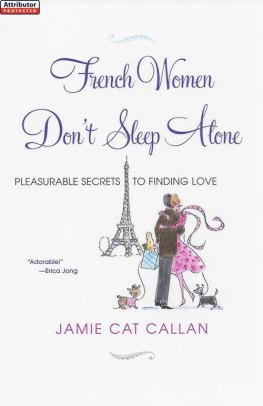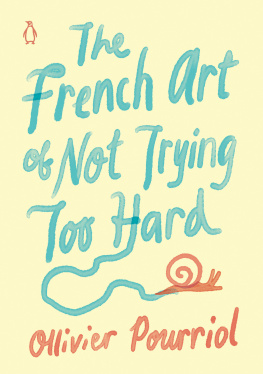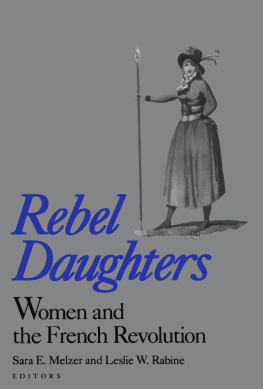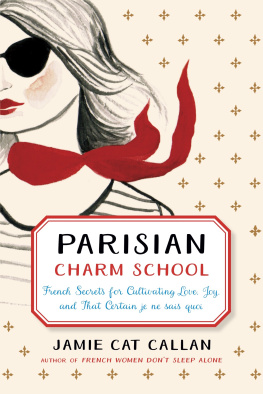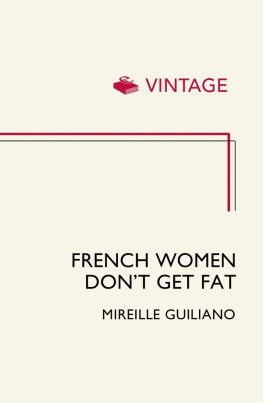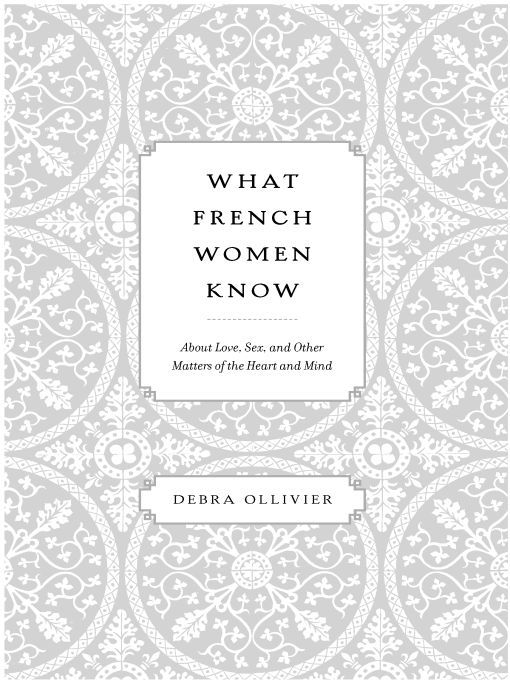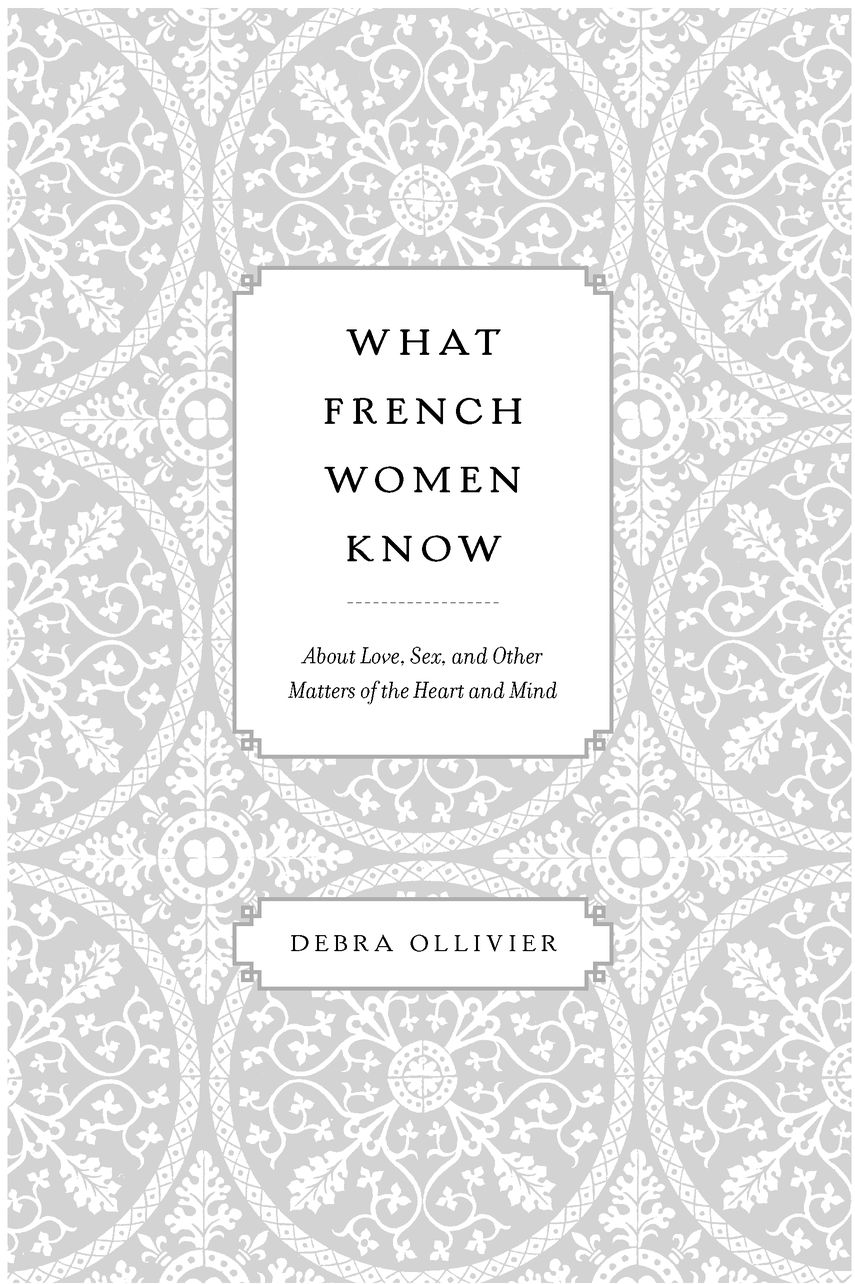Table of Contents
G. P. PUTNAMS SONS
New York
It is good to know something of the customs of different people in order to judge more soundly of our own, and so that we might not think that all that which is contrary to our own ways be ridiculous and contrary to reason, as those who have seen nothing have the habit of doing.
DESCARTES
Introduction
The first French woman I met in America was an enigmatic neighbor who moved into the Los Angeles enclave where I lived as a girl. This woman was clearly not... normal. She wore scarves in the sun. She walked the aisles of our local grocery store in cruel-looking high heels, examining produce as if she might perform angioplastic heart surgery on a tomato. Her two kids, pale and well-behaved, wore socks with sandals (a crime in Los Angeles), and they all spoke in forked tongues. In the shaggy-haired aesthetic of Southern California, this woman, whose complicated bun looked positively theatrical if not slightly menacing, had a truly alien quality about her; even her car looked otherworldly. (It was, it turns out, a Citron DS Cabriolet.) One day, feeling unusually brazen, I approached her in the supermarket while she was analyzing the molecular infrastructure of a cantaloupe and asked where she was from. In one of those harbinger moments she looked back at me and replied: Were from France.
Ah, so that explained everything. This was years before the infamous Saturday Night Live skit put the Coneheads on our cultural radar, but, in the Happy Face go-go jet age of Los Angeles at that time, it did explain her Otherness. Her luxuriant, slightly scary, French-fried Otherness.
Madame France, as I used to call her, went on to become a neighborly friend of sorts. My mother welcomed her to our street with a plate of homemade chocolate-chip cookies. She returned in kind with a bottle of Armagnac. There was the question of the husbandwhere was he? Was she a widow? A divor ce? No one knew, which only made her more enigmatic. I ended up playing with her two kids, who were petulant and friendly in equal doses, and I recall using my first few lines of French on her and being corrected the time I told her that I was going to eat my dinner. Je vais manger mon dner, I said. She shook her head and replied, No, my dear, animals eat. Human beings dine. The sheer French velocity of her reply made my knees ache.
At the time, I knew that France was a place of sensual and cultural refuge. Josephine Baker became a star there wearing nothing but pearls and a banana skirt. Henry Miller penned nasty novels in his Parisian black lace laboratory, which were banned in America. People always flocked to France for intellectual freedom, hot sex, high culture, and fabulous foodnot necessarily in that order. And in the firmament of all, this no star shined brighter, it seemed, than the French woman.
The French woman, of course, has enjoyed an alluring and slightly tarty reputation for centuries. Shes a coquette, a femme fatale, a sex kitten, a vamp, and a bitch. Shes a sophisticate, a fashion hound, an iconoclast, and a rebel. Even her language has remarkably seductive attributes. Tish! When you speak French, it drives me wild, cara mia! Gomez famously declares to Morticia in The Addams Family. (Apparently, her French did wonders for his sinus condition as well.) Ever since the French gave us our Statue of Liberty, they have peppered our culture with their peculiar and piquant ways, enduring as paragons of otherness and dubious stereotypes. The bad guy is often French. The mistress is always French. The bitch and the bastard are usually French (and, while were at it, the cook, the thief, his wife and her lover). The scary woman with legs out to here is invariably French. And the devil always has a French accent.
No wonder we perceive the French woman as slightly wicked. Her passions are our provocations. We love her and we hate her because she seems to be everything were not, and because her way of being contradicts our cultural judgments and moral prejudices about love and sex. Plus, were sure that shes got secrets. It seems she grew up steeped in sensuality while we were raised on canned heat. She certainly seems to know more about giving and receiving pleasure, which means that shes probably having more guilt-free sex than we are and eating a lot more pastry, too.
Like many Americans, I first traveled to France as a student backpacker. A few years later I returned, enrolled myself in the Sorbonne, and moved into a converted broom closet in the posh but gloomy 16th arrondissement with a roommate named Solange.
Solange was from Alsace. She was pale with straw-colored hair and reminded me of a garden elf. Despite this cherubic quality, she had a severity about her that evoked the rustic plains of her ancestral Northern Europeat least thats how I perceived her penchant for frugality. She ate cheese to the rind, then dried it and grated it into her soup. (Similar rituals were performed with dried half-eaten baguettes.) She was reserved, rarely gesticulated, and had three articles of clothing that she wore over and over again, with tiny adjustments to each look. In short, though Solange was no va-va-voom French girl, she did, despite her curiosities, have a certain undeniable charm and sex appeal, and I recall thinking that if she were a typical French girl, Id have to adjust my cultural assumptions. I was already aware that the proverbial je ne sais quoi we Anglo-Saxons associate with French women did not have as much to do with surface detail as one might surmise.
During my sjour at the Sorbonne I read many nouveaux romans, wore many scarves, and through my daily encounters with the natives nurtured my own vigorous love/hate relationship with the French. A thick, delicious year passed, and upon my return to California I assumed that my French days were over.
They were not.
Years later, I met a man working on a film in Los Angeles. I immediately knew that he was French because he was eating a hamburger with a fork. We courted and I moved back to France again, where I married, had two children, and continued to study the local flora and fauna up close. This time I lived in the northeastern fringe of the citys Right Bank, in the 19th arrondissementa raggedy but rapidly gentrify ing working-class swatch of northeastern Paris that I call Peoples Paris for the sheer density of humanity packed into it from every corner of the world. (A Parisian friend of mine once sniffed: I need a passport to enter your neighborhood. At the time, his incurable snobbism deeply impressed me.) Its certainly a reminder that if France is the Eiffel Tower, its also the Tower of Babel, and that goes for everything beyond the dense supernova of the citys capital as well.
Be that as it may, when I first moved to the 19th you couldnt find it on the maps of many guidebooks. It seemed as if their guidebook writers had laid a cookie cutter on the center of Paris, trimmed off the edges, and discarded them. Only a few landmarks scattered in these northern fringes were mentionedthe Pre Lachaise cemetery; Montmartre. Otherwise the only real Paris that seemed to exist to purveyors of all things French was its centernamely, the Left Bank.
I bring this up to make a point, which is this: most of the enduring stereotypes we nurture about French women are exported from this center, where so many cultural scribes and tourists stake their claim. Its through the prism of this gilded old hub, in arrondissements nestled around the Seine, that we find our most enduring French clich. You know her: shes


